
 |
||||
|---|---|---|---|---|
| Volume 51 Number 10, March 27, 2021 | ARCHIVE | HOME | JBCENTRE | SUBSCRIBE |
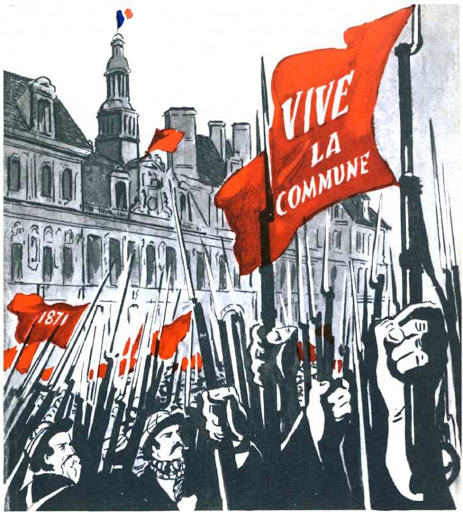
On Saturday, March 20, the Truth and Memory Committee, based in South Tyneside, held an online meeting to mark the 150th anniversary of the Paris Commune. The meeting was entitled The Paris Commune: Showing the Way Towards a New Society. The speakers and the discussion reflected the reality of this momentous event in the historical struggles of the working class and people when they took power and started to build the new state arrangements that gave power to the working people. A film montage of the Paris Commune was shown which was accompanied with a choral rendition of The Internationale in French and English. The discussion of the meeting concentrated on why the Paris Commune remains so relevant to the modern world where people are still marginalised from decision making power by the Westminster "parliamentary democracy" that serves the rich. Besides a short history of the Commune, two presentations were given, and we are reprinting below some of the points made in the talk entitled The Paris Commune and the Need for Political Power.
The speaker began by celebrating this historic anniversary saying that "what they established on March 18, 1871, was something entirely new and something that brought a new quality into being". She pointed out, "For the first time in human history the people took control and then established political power in Paris, an event which shook the world and stood as a beacon for future societies and political movements". Unlike anything that had happened before, where arrangements had been entered into to keep actual power within the hands of the elites, "what happened on March 18 was the establishment of a proletarian government and a proletarian state", which represented, as Marx boldly says in his writings on the Paris Commune, "a historic initiative".
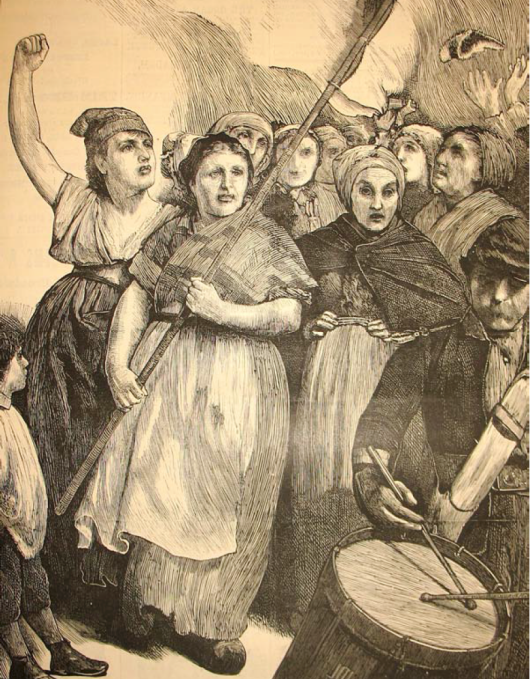
The speaker pointed out that the Paris Commune became a touchstone for political movements across the world, including the Great October Socialist Revolution, and other revolutions and political change, and it still resonates today. The significance of the Paris Commune is that it established a new consciousness in the world that a people can rise up and establish their own state and completely throw out the ruling elites of the old order; that knowledge can never be erased.
The speaker asked how the Paris Commune resonates today, what lessons can be learned from it and what does it reveal. History is calling on us to recognise, not just to celebrate, what their experience says to us today.
The speaker compared the situation in France prior to the Paris Commune with the arrangements that had been put in place by Hobbes and Cromwell in England in 1649 where the ruling elites had sought to resolve the Civil War there by giving the illusion of empowering the people whilst actually putting in place arrangements to keep the decision making and political power in the hands of the elites. In other words, the various Republics and administrations that wielded power in France throughout the 1800s still represented forms of oppressive class rule by the ruling elites.
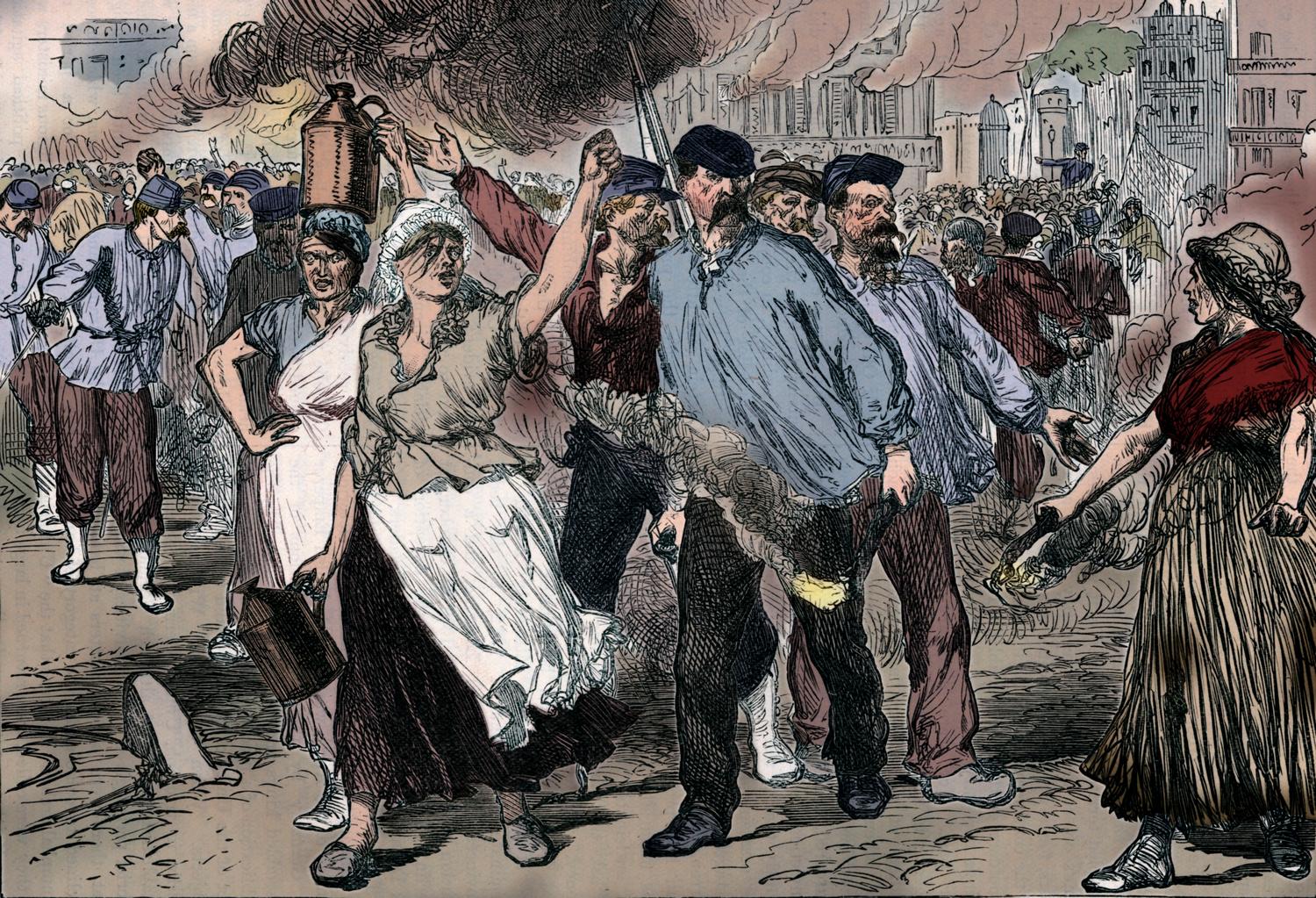
The speaker went into how, in Marx's words, in France the "full-grown bourgeois society had finally transformed into a means for the enslavement of labour by capital" with its extreme repression of the people and against the backdrop of the Franco-Prussian War being waged at the time, which ran for years. Marx wrote that "the direct antithesis to the empire was the Commune. The cry of 'social republic', with which the February Revolution was ushered in by the Paris proletariat, did but express a vague aspiration after a republic that was not only to supersede the monarchical form of class rule, but class rule itself. The Commune was the positive form of that republic."
What was key at the time and what enabled the success of the Paris Commune, was that its first act was to suppress the standing army and replace it with an army of the people which became known as the National Guard. The standing army had consisted mainly of working men who had been dragooned into fighting in the Franco-Prussian War. Those men stationed in Paris, itself a working-class hub, "had risen in arms against the attempt of Thiers and the Rurals to restore and perpetuate that old governmental power bequeathed to them by the empire", and had willingly joined the cause of the Commune.
The speaker read from Marx's report on the Paris Commune:
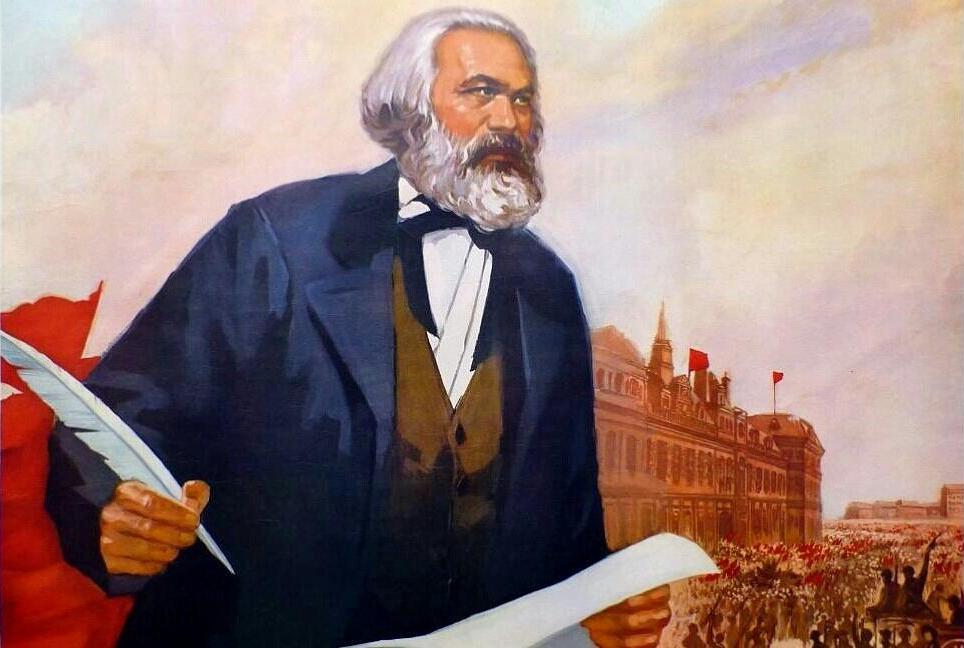
Working men's Paris with its Commune will be for ever
celebrated as the glorious harbinger of a new society - Karl Marx to the
International Working Men's Association, May 30th 1871.
On the dawn of March 18, Paris arose to the thunder-burst of "Vive la Commune!" What is the Commune, that sphinx so tantalising to the bourgeois mind?
"The proletarians of Paris," said the Central Committee in its manifesto of March 18, "amidst the failures and treasons of the ruling classes, have understood that the hour has struck for them to save the situation by taking into their own hands the direction of public affairs.... They have understood that it is their imperious duty, and their absolute right, to render themselves masters of their own destinies, by seizing upon the governmental power."
But the working class cannot simply lay hold of the ready-made state machinery and wield it for its own purposes.
She further quoted from Marx:
The gigantic broom of the French Revolution of the 18th century swept away all these relics of bygone times, thus clearing simultaneously the social soil of its last hindrances to the superstructure of the modern state edifice raised under the First Empire, itself the offspring of the coalition wars of old semi-feudal Europe against modern France.
The speaker went on to draw comparisons with our society today where, "as regards the issue of the standing army, if you look at today's world, we have a parliament that right now is trying to increase police powers. We have a government which has just given itself billions of pounds in the middle of a pandemic when it is saying that it cannot increase the pay of health workers by more than one percent and that it cannot pay educationalists because it does not have the money, and yet it is paying itself billions to increase its nuclear capacity and to increase Britain's ability to intervene globally, which can only be to the detriment of peace, security and sovereignty". "Certainly," she said, "our standing army is not defending us."
Strikingly, the people of the Commune felt completely safe. Marx wrote:
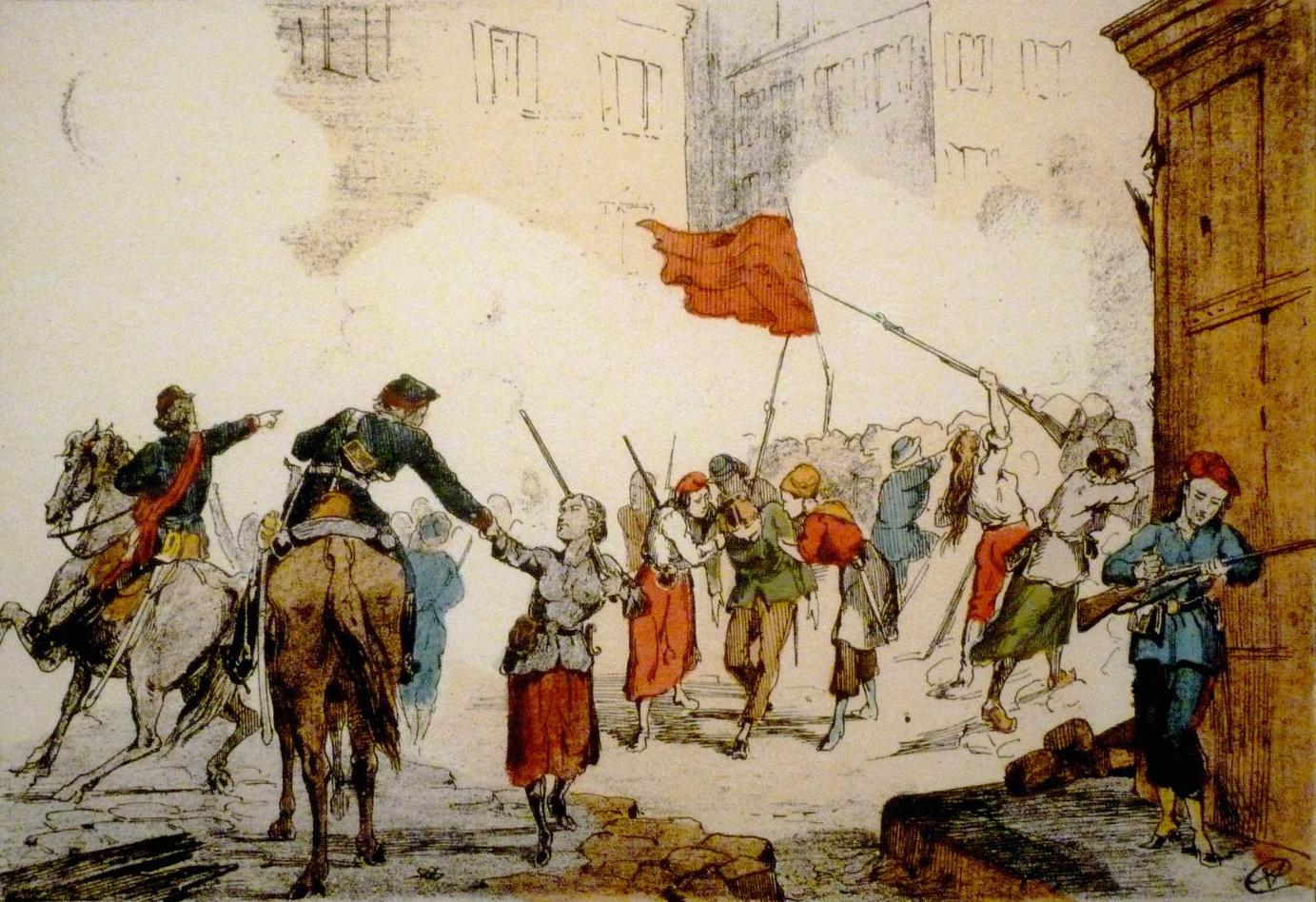
Wonderful, indeed, was the change the Commune had wrought in Paris! No longer any trace of the meretricious Paris of the Second Empire! No longer was Paris the rendezvous of British landlords, Irish absentees, American ex-slaveholders and shoddy men, Russian ex-serfowners, and Wallachian boyards. No more corpses at the morgue, no nocturnal burglaries, scarcely any robberies; in fact, for the first time since the days of February 1848, the streets of Paris were safe, and that without any police of any kind.
"We," said a member of the Commune, "hear no longer of assassination, theft, and personal assault; it seems indeed as if the police had dragged along with it to Versailles all its Conservative friends."
Drawing attention to this new sense of relief and protection brought about by the Commune and the measures it put in place, the speaker emphasised how the role of women in the Commune was so crucial and uplifting. She quoted Marx's comment on the women of the Paris Commune in contrast to the bourgeois women then cowering in Versailles:
The cocottes ['chickens' - prostitutes] had refound the scent of their protectors - the absconding men of family, religion, and, above all, of property. In their stead, the real women of Paris showed again at the surface - heroic, noble, and devoted, like the women of antiquity. Working, thinking fighting, bleeding Paris - almost forgetful, in its incubation of a new society, of the Cannibals at its gates - radiant in the enthusiasm of its historic initiative!
And the women played an outstanding role. Only three weeks into the Paris Commune on April 11, 1871, the women of the Commune formed the Union of Women. The call was given that there was going to be a meeting, and posters were put up all over Paris calling on women to come and defend and be prepared to die for the Commune. They called on laundresses, on seamstresses, on bookbinders and on milliners to attend. Women responded to this call coming en masse from all over Paris. They then established a new organisation called the Union of Women.
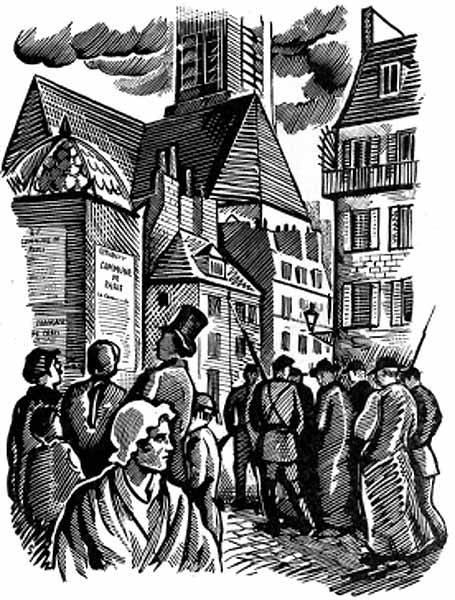
The speaker described how within days of its formation, the Union became one of the most important organisations of the Paris Commune, with socialist women playing an indispensable role in organising the working women of Paris to become Communards. Women such as Louise Michel were outstanding fighters and are still celebrated today in France and across the world.
Following these comments, the speakers talked about today's circumstances. She said that "it is no small matter that here we are in 2021, and it is women who are on the streets across the entire world and who are speaking out and protesting because they do not feel protected. They feel vulnerable in their societies because our societies allow and even encourage attacks on women, often treating them as fair game." By contrast, "one of the things that Marx says about the Paris Commune, and one of its heroic features, was that the women took up arms and were active in the defence of the rights of all in the Commune, and in so doing, participated in ensuring that no one in the Commune felt vulnerable and that everyone was protected. Indeed, they felt empowered to walk the streets free from attack."
The speaker highlighted the experience of women right now here in Britain, where women are feeling vulnerable in our streets. However, she said that "the problem is not one of reprogramming men's heads. It is not about something "over there" and somehow done to us. Rather it is systemic and linked with the treatment of women as a collective. As such, it requires the participation of women in sorting out the problems as part of sorting out the problems of the whole society. It requires the recognition that the security of women lies in the fight for and defence of the rights of all!"

Online meeting poster
The speaker asserted that "what we see happening in the Paris Commune is that these rights were being established by men and women, and that what was being established as a consequence, and through the actions of all these bodies and discussions, was the establishment of the political power of the proletariat. This was what was so threatening to the bourgeoisie and to all powers and countries around the world; and that at all costs, they could not allow this to happen."
One of the important lessons of the Paris Commune today was one of empowerment. She said that "in the act of the birth of the Paris Commune was born this conception that the proletariat could and must take power to solve the problems of society and bring into being, as its historic duty, the new".
Indeed, it points to what we must do in today's world. "What has been given rise to is that we need to take up the example of the Paris Commune and to take a stand on what is going on, and to speak out in our own name. We need now to recognise what is necessary to be done at this time and what is being given rise to. We see that our governments and our societies are increasingly subduing the people, and that, under the guise of the current pandemic, they are trying to stop the voice of the people, even to stop the limited means accorded them through so-called representation in parliament, by suspending elections or limiting the participation of those who are allowed to comment in parliament."
She drew attention to the need for an Anti-War Government where the issues of the people can be brought to the fore and where, as with the Paris Commune, the people can bring an end to all foreign intervention and wars. Learning the lessons of the Paris Commune, we must fight to bring about the involvement of and to the empower people in decision-making and the control of their lives, and that the working class must constitute themselves the nation.
The talk concluded with a statement of Marx:
If the Commune was thus the true representative of all the healthy elements of French society, and therefore the truly national government, it was, at the same time, as a working men's government, as the bold champion of the emancipation of labour, emphatically international. Within sight of that Prussian army, that had annexed to Germany two French provinces, the Commune annexed to France the working people all over the world.
The Paris Commune represented the fight of the new against the old and brought a new quality into being. It demonstrated that the proletariat could establish something new against the claim of the old to its right to rule by force based on class privilege, wealth or birth. In so doing, the Paris Commune showed that it could be done whilst sowing the seed of an unstoppable idea that shone a light on the path to a new society.